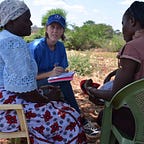Embracing our differences
The first ‘culture’ day is held in the WFP Regional Bureau, Nairobi
This year the Regional Bureau in Nairobi (RBN) introduced its Engagement Roadmap — the aim of which is to build a partnership between staff and WFP that stimulates enthusiasm for organizational success. Given the diversity of our office, currently 29 different nationalities, it was agreed to have a ‘culture day’ to learn more about our colleagues and their home countries. The event was organized by a team of ‘champions’, who embraced the challenge despite their heavy work schedules.
The event took place on 2nd November and staff braved the heavy rain and went all out to showcase their culture through performances, stunning traditional outfits and exotic foods. Given the divisive election period in Kenya, and indeed similar events elsewhere in the world, it was an excellent opportunity to remind ourselves that there is more that connects us than divides us.
Six continents, Ten teams
The largest proportion of staff in RBN are obviously from Kenya, so they were split into five teams from different regions around the country. There were an additional five teams representing Asia, the Americas, Europe and the rest of Africa.
Artifacts, Performances, Cultural Trivia, Food and Drinks
All teams had a dedicated stand to display their cultures creatively, with prizes being awarded for the best stand, best cuisine and best dressed lady and gentleman. The teams all worked hard to showcase their culture in a colorful and creative manner.
A stunning Swahili cultural performance awed all in attendance, the Americas team treated the crowd to a musical note led by Ernesto Gonzalez on guitar and the Western Kenya team showcased a traditional dance. The Maasai team with their traditional marriage song had a ‘Moran’ shooting like an arrow into the sky in a jump characteristic to Maasai traditional warriors. A traditional wedding presided over by Allan Orimba speaking in a language “only the gods could understand” highlighted the importance of family in the African traditional set-up. The All Africa team had a medley of dances from across Africa with Zambia, Zimbabwe, Cameroon, Senegal, Ethiopia, Eritrea, Ghana and Uganda all represented. The Europe 2 team poked fun at the current state-of-affairs in Europe through a short comedy sketch. The second Europe team embraced all things Irish with a presentation on the origins of whisky and offering some tastings (sample size only!).
The teams went on to compete in a cultural trivia, arranged by the Asia team, to assess their global knowledge. No better way to learn than through some healthy competition!
Food tastes better when you eat it with family
Nothing brings people together like good food and there was certainly plenty of it — sushi, samosas, salads, mahamri’s, churros, hibiscus juice, humbasha, pretzels, tacos, nyama choma, crepes, matoke, Irish stew and so much more. To prepare the taste buds of participants, teams gave a short overview of the culinary delights on offer on their stand before the master of ceremonies, Kenyan actor John Sibi-Okumu, challenged people to eat something they have never had before.
The Regional Director, Valerie Guarnieri, also took the opportunity to award Ruth Twist with her service pin for 25 years of work with WFP, as well as to Isabel Burchard, marking 10 years of service. The day was crowned by celebrating the birthdays of those colleagues born in October and November with a serving of a sumptuous birthday cake.
The RBN plans to make ‘Culture Day’ an annual event. In the words of former UNSG Kofi Annan:
“We may have different religions, different languages and different coloured skin, but we all belong to one human race.”
